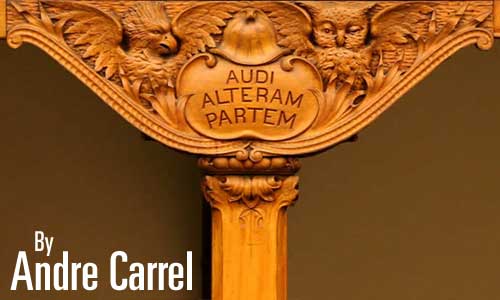OPINION: ELECTORAL REFORM -- A Response to Loenen's Proposal
Editor’s Note: Andre Carrel, author of the following response to Nick Loenen’s proposal on electoral reform, was born and raised in Switzerland. He immigrated to Canada in 1963 and holds dual citizenship. He is a retired municipal administrator, and has published a book on local governance: “Citizens’ Hall: Making Local Democracy Work” — Toronto, 2001) He writes occasional opinion pieces for newspapers and on-line publications.
Federal Electoral Reform
Response to Nick Loenen’s Dec. 2015 Proposal
Canadian Political Culture
Loenen’s reference to “a strong local connection” in Canada’s political culture comes as a surprise. The only Canadian jurisdiction where local connection to elected politicians has any meaning at all is at the territorial level in the Northwest Territories and in Nunavut. At the national level, Canada’s political culture is framed by political parties, and increasingly by the personality of party leaders.
On occasion we hear reference made to the federal government, but far more often than not media (and citizens) refer to the federal government by substituting the party name or party leader’s name for the jurisdiction identifier.
Seats in the House of Commons are allocated on the basis of the elected members’ party affiliation, not by their geographic origin.
We no longer have the Conservative or the Harper government, we now have the Liberal or Trudeau government, and if emphasis is needed, the media will refer to the Trudeau Liberal government. Our political culture ignores the constitutional reality that the federal government is ongoing. Canadians, under our present constitution at any rate, are never without a federal government – not even for one second. But that is not what our political culture would have us believe. Our political culture would have us believe that the Harper Government came to an end on October 19, 2015, and that the Trudeau Government assumed power on November 4, 2015. The intervening period is thought to be a hiatus of some kind.
I am not aware of a single instance (allowing that I have not researched the subject at all) in which members of parliament voted in geography-based union on any issue: urban vs. rural, north vs. south, east vs. west, prairie vs. mountain vs. coastal. By the same (lack of) research, I am not aware of citizens who may have voted for candidate X because of her background knowledge and understanding of the constituency and her skill in expressing the constituency’s wishes and needs, notwithstanding the fact that she represents a political party whose policies are contrary to their views on what is best for the country.
The experience of the recent federal election was consistent with the country’s long-established political culture. Citizens declared their intention to vote for Trudeau, for Mulcair, for Harper, even as the constituency in which they cast their ballot was a thousand miles (sorry, I meant 1,609 km) removed from the location where the names Trudeau, Mulcair, and Harper were featured on the ballot.
The party and party leader orientation of our political culture runs deep, and it is not easily rattled. What is the likelihood of CBC referring to the Gender Balanced Government, the English/French Government, or the All-Provinces-Represented Government on a story concerned with a federal government decision, compared to the likelihood of referring to the Liberal Government, the Trudeau Government, or the Trudeau Liberals?
Democracy’s Philosophy
The citizen is the foundation of a democracy. The citizen is central to democracy just as Jesus is central to Christianity, Buddha to Buddhism, and Mohammed to Islam.
It is physically and practically impossible for all citizens to assemble for the purpose of making the decisions that affect society. That reality is the only reason democracies hold elections. It is crucial that the process by which citizens elect representatives to govern on their behalf be owned by citizens (it is the rationale of my letter to Minister Monsef of Nov. 16, 2015, to which I have yet to receive a response).
Loenen recalls that a Preferential Ballot electoral system had been in effect in Manitoba and Alberta for thirty years, and that “its discontinuance was at the hands of politicians. The voters had no say.” Loenen also recalls the 2005 referendum on electoral reform in British Columbia where 58 percent of voters called for the system to be reformed. Loenen suggests that the attempted reform “failed because political interests had decreed the referendum must fail unless support reached 60 percent.”
Loenen’s explanation is consistent with Canada’s political culture. The 2005 referendum was held pursuant to rules and regulations adopted by British Columbia’s Legislative Assembly with the adoption of the Electoral Reform and Referendum Act (SBC 2004) Chapter 47. The referendum’s rules were not decreed by “political interests”, these were legislated by the people we had elected under the first-past-the-post system.
I want us to put an end to the precedent of elected people making the rules governing their re-election. I want a change of course in Canada’s political culture: I want citizens to make the decision on the process by which they will elect future representatives to the House of Commons.
Global Precedents
Loenen refers to success of the Preferential Ballot system in Ireland and Australia. I do not know their systems as well as I know the Swiss proportional system (I was born and grew up in Switzerland). The Swiss had their last parliamentary election on October 15, 2015. Thirteen parties participated in the election, and 11 parties are represented in the 200-seat parliament. The strongest party, with 29.4 percent of the vote, gained 32.5 percent of the 200 seats. The Swiss have been governed by a four-party coalition since the 1950s. By any measure, be that political, cultural, social, or economic, Swiss citizens have not suffered unduly under their proportional electoral system.
I am surprised that Loenen would present Australia as example to consider in support of the Preferential Ballot. When one reflects on the radical change in Australia’s position on the environment under Liberal Prime Minister Abbott to that pursued by his successor, Prime Minister Turnbull, also a Liberal, it leaves one wondering what environmental policy, if any, Australia’s Liberal Party stands for.
What a Democratic Canada Needs
Loenen fears that Proportional Representation may be “too much change”. My fear is that Preferential Ballot, even with multi-seat districts, is too little change.
Canada is a multitude of multitudes: geographic, cultural, economic, social, and racial. The crucial challenge facing our House of Commons is not for the party holding the majority of seats to implement all of its election promises. The crucial challenge is for the House of Commons to find workable compromise approaches to the many challenges we face as a nation. A compromise is a solution which no single party may be prepared to embrace with enthusiasm, but one which most parties can live with, can accept as being reasonable under current and foreseeable circumstances.
The least effective government is one in which one political party (or a two-party coalition) has the power to impose its will on the country. Imagine a Canadian House of Commons where a dozen political parties are represented. A House of Commons where at least four parties would have to agree on any measure for it to be adopted by a majority vote. If that were reality, how likely would it be for measures such as the abandoning of the long-form census or the bombing of a foreign country to be decided without debate? How likely would it be for a government to push, under time restraint, omnibus bills that amend dozens of acts with thousands of clauses and covering hundreds of pages, through the House of Commons?
Democracy’s enemy in Canada (not to sound too dramatic) is the propensity for a single political party to have the power to impose its will without consideration of those who may hold a different view. That propensity is not likely to be cast aside by the Preferential Ballot.
Thank You, Nick.
Thank you for having taken the time to write a proposal for electoral reform and for giving me an opportunity to respond.
























